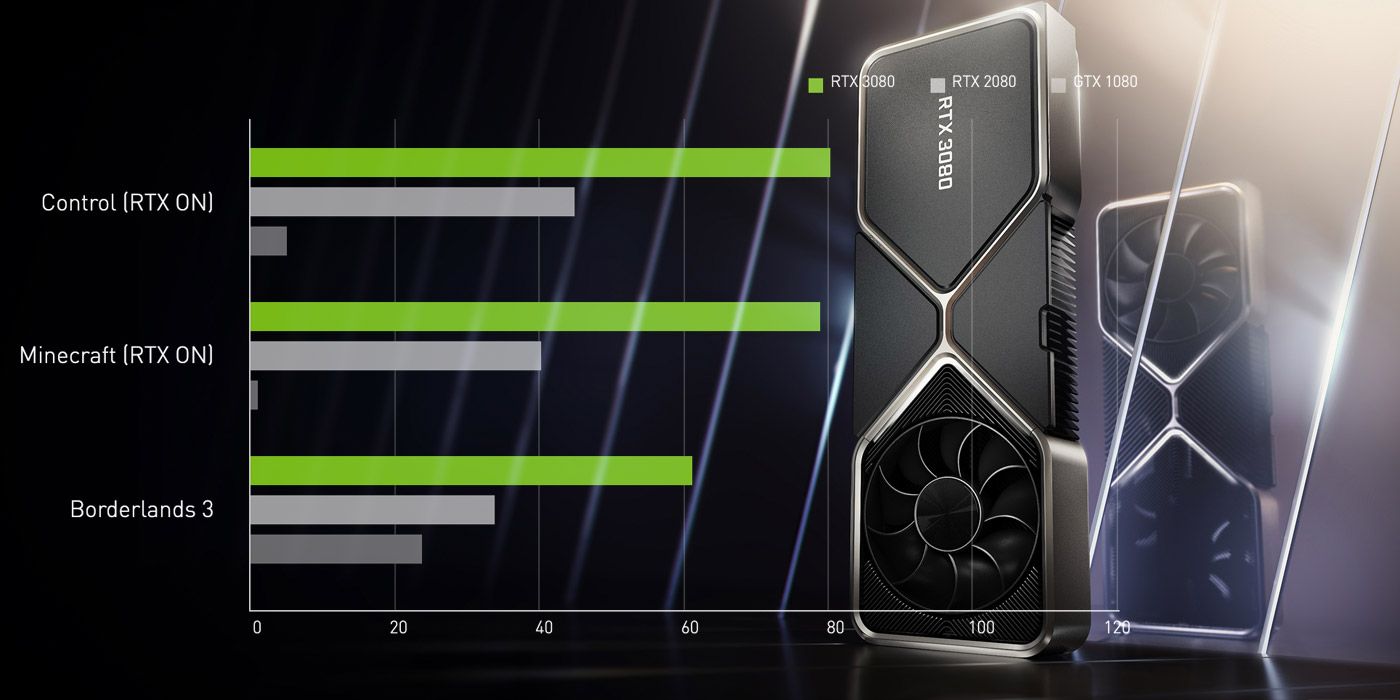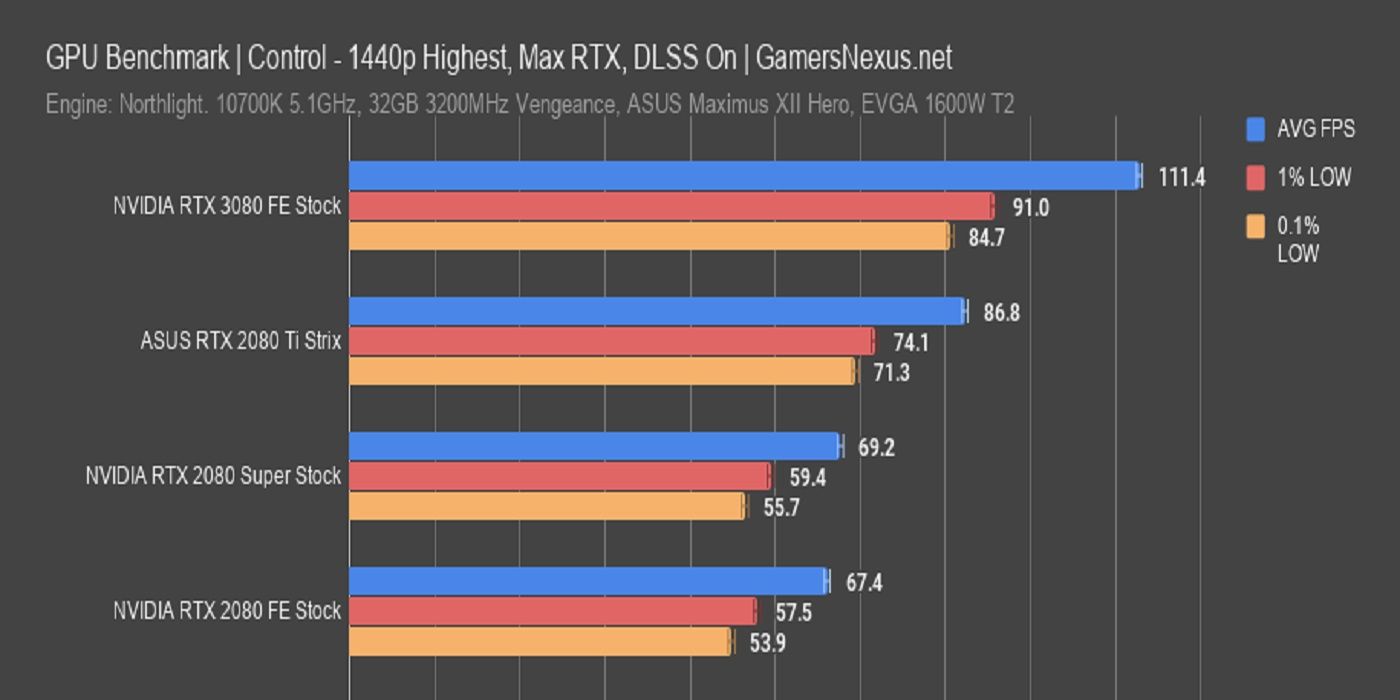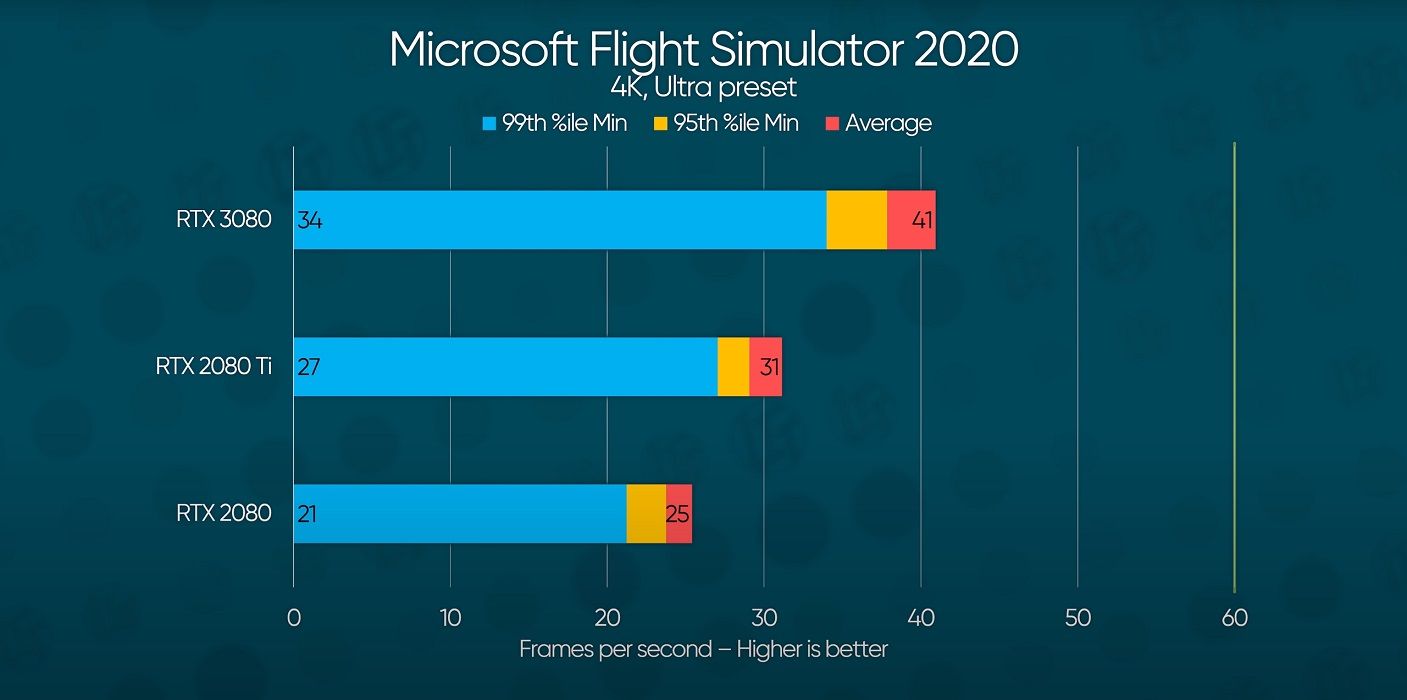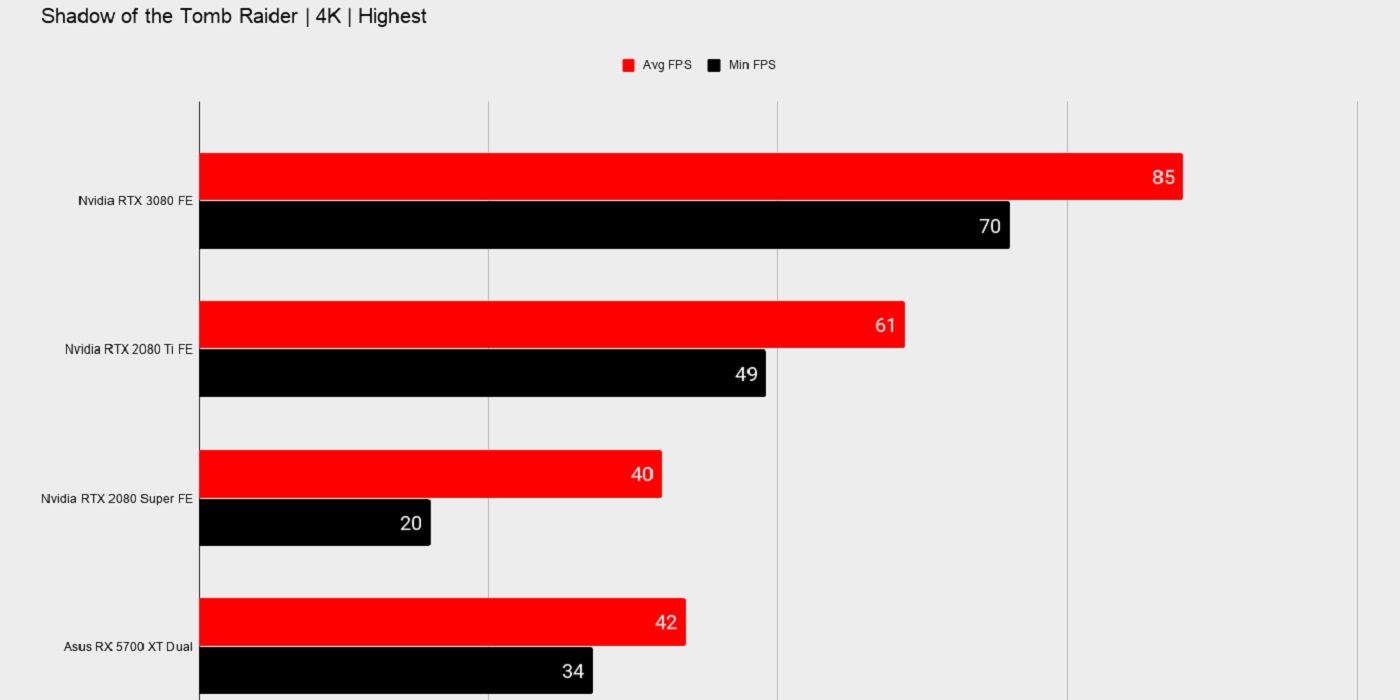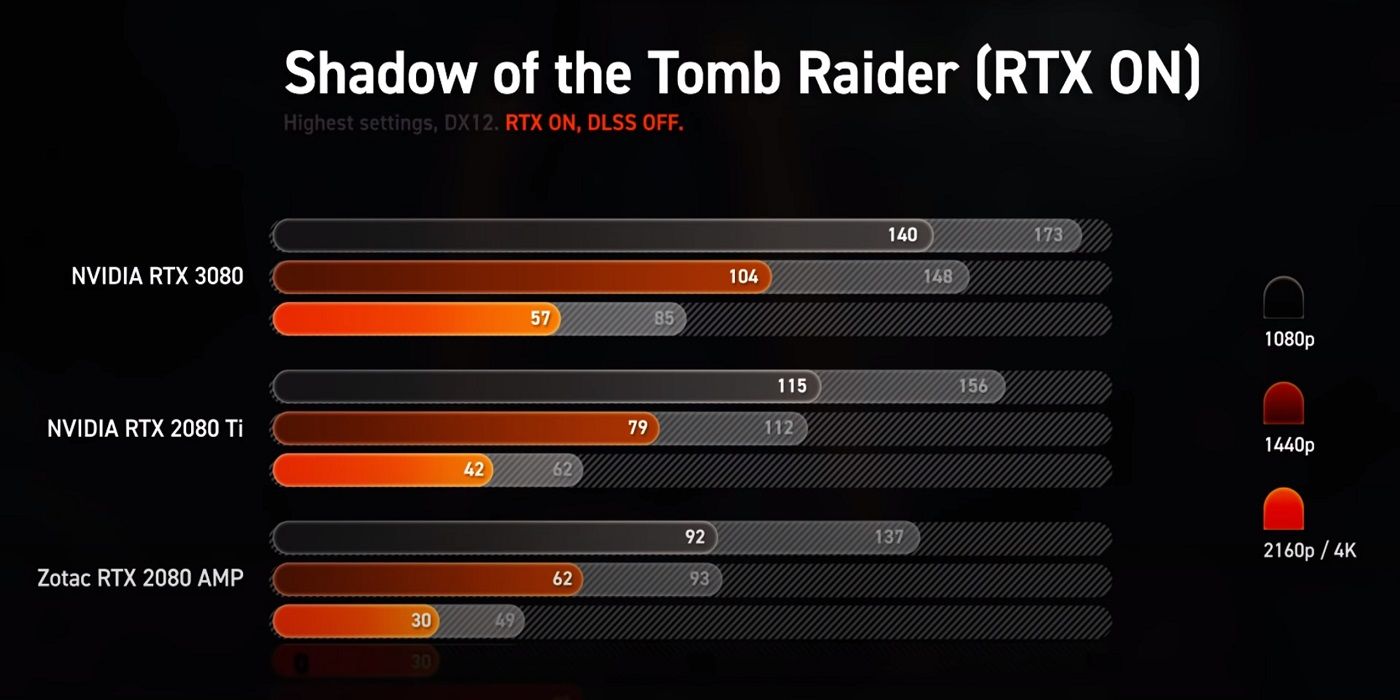As Nvidia releases its new graphics cards in a slow trickle, the hype surrounding 30-series GPUs has increased to a fever pitch. The availability of the 3080 is scarce, but the performance numbers promised by Nvidia are almost too good to be believed. The company itself is touting this as the biggest generational leap in graphics tech its ever had, but for a long while, consumers have only had the company's own word to go on. Now, select reviewers have received 30-series cards, and Nvidia's claims can be put to the test.
Some reviewers take it upon themselves to run a wide array of popular games on new PC hardware and collect detailed data on performance. Every test rig, every reviewer, and even every individual graphics card is unique to some extent, so it takes looking at a few different benchmarks to get a proper idea of how well a card performs.
The 3080's specs are impressive, but it has only been in reviewers' hands just long enough for a good collection of data to be available. The new 3090's performance numbers will be slowly revealed by independent parties over the next few weeks. As the flagship card, the 3080 should be a perfect indicator of things to come.
GamersNexus
GamersNexus has done extensive testing of the 3080's cooling, power draw, noise levels, and other technical specs, but they also did plenty of game benchmarks. With twelve different titles tested at various graphics settings and resolutions, there's a lot of data to go through, but a few key games stand out as indicative of the 3080's capabilities. In Red Dead Redemption 2 at 4K with high settings, a stock 3080 gets an average of 85.1 FPS where the 2080 SUPER gets 53.8. Microsoft Flight Simulator, an infamously difficult game to run even on high-end hardware, got an average 52.9 FPS on the 3080 and 36.2 on the 2080 SUPER at 4K.
RTX games are a slightly different story. With much higher RT core counts, 30-series cards promise a huge jump in practical ray-tracing performance. Control, a title that is renowned for its extensive use of ray tracing, got an average 64.8 FPS at 4K with max settings, and only 36.3 FPS on a standard 2080 at the same settings. At 1440p, the split was 111.4 for the 3080 and 67.4 on the 2080. While Nvidia's "double the performance of a 2080" claims aren't exactly true across the board, its clear that the 3080 sees the most performance improvement at high resolutions and with ray tracing turned on. At 1080p or 1440p and on non-ray tracing titles, the performance gains are slightly less impressive.
Linus Tech Tips
LTT's testing focused on benchmarks for games and creative applications. We'll focus on their data for game performance at 1440p. Metro Exodus, another game like Control that makes good use of ray tracing, got an average of 58 FPS at 1440p/Extreme graphics preset/DXR on with the 3080, while the 2080 averaged 34.
A very high FPS, no ray tracing title, CS:GO averaged 467 FPS at 1440p/Very High on the 3080, and 409 FPS on the 2080. The same pattern is repeated, with games that use ray tracing benefiting far more than older games that don't use the new tech. When it came to Microsoft Flight Simulator, LTT had a different story to tell than GamersNexus. At 4K/Ultra, the 3080 averaged 41 FPS while the 2080 got 25. That's lower across the board than GamersNexus, but still paints the 3080 in a positive light.
PCGamer
PCGamer's 3080 got 103 FPS in Assassin's Creed Odyssey at 1080P Ultra to the 2080 SUPER's 75. Bumping the resolution up to 1440p and 4K changed that comparison, clocking in at 90 FPS on the 3080 to 68 on the 2080 SUPER, and 66 on the 3080 to 45 on the 2080 SUPER, respectively. In comparison with LTT, Metro Exodus at 1440p and Ultra settings got 110 FPS on the 3080 and 72 on the 2080 SUPER. PCGamer's reviewer was most taken with the 3080's jump over the 2080Ti at such a comparatively low price. In Shadow of the Tomb Raider at 4K, highest settings, with both Ray Tracing and DLSS, the 3080 got 69 FPS, the 2080Ti got 56, and the 2080 SUPER got 39.
JayzTwoCents
YouTuber JayzTwoCents pointed out an interesting pattern: whatever frame rate the 2080 gets at 1080p, the 3080 can do at 1440p. The same goes from 1440p to 4K. It's not an exact rule, but it is clear enough that anyone planning on getting a 3080 might also want to upgrade their monitor at the same time.
In Metro Exodus with Ultra graphics and RTX plus DLSS on, the 2080 managed 61 FPS at 1440p, while the 3080 got 68 FPs at 4K. Red Dead Redemption 2 at maximum graphics got 63 FPS at 1080p on the 2080, and 72 at 1440p on the 3080. In Control, the pattern repeats. At max graphics, the 2080 managed 57 FPS at 1080p, 37 FPS at 1440p, and 18 FPS at 4K. The 3080 got 100FPS at 1080p, 68FPS at 1440p, and 35FPS at 4K.
Across the board, the 3080 is clearly an impressive piece of hardware. While the double performance that Nvidia promised over the 2080 isn't exactly accurate, it's still a remarkable leap in graphics tech that warrants serious attention. 3090 performance numbers will be out soon too, but the real test of 30-series cards will be the 3070. For most consumers, these high-end products just aren't practical, but the 3070 will be a great way to show what Nvidia has to offer closer to mid-range. If it provides a performance leap close to the 3080, it will be a great deal for gamers everywhere.

